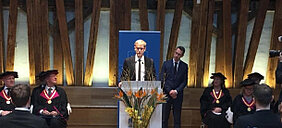Space Colloquium Würzburg
14.04.2022Invitation to the Space Colloquium Würzburg titled "A High-Precision GNSS Payload Board for Nanosatellite Orbit Determination and Timing" by Prof. Dr. Gregor Moeller (ETH Zürich) on the 14th of April 2022 at 17:00. This event is supported by Elite Network of Bavaria (ENB) and ESA_Lab@ZfT.
In 2013, the CubETH project was initiated at ETH Zürich with the vision to perform GNSS measurements onboard nanosatellites with very small and power-efficient navigation receivers. As of April 2022, twelve nanosatellites are operated with our innovative GNSS payload board. The raw measurements from each satellite provide us a very detailed insight into the capabilities of the GNSS receiver. Processed on a routine basis, the data allow for the prediction of satellite orbits, e.g. for collision avoidance and maneuver analysis. In 2019, we started with the development of the next generation GNSS receiver for high performance applications, benefitting from the lessons learned from the initial experiments. In this presentation, the results of a two-year cubesat mission as well as the status and plans for the new GNSS board are highlighted. Based on the outcome, on the suitability of the selected GNSS hardware for dm to cm orbit accuracy and, therefore, on the suitability for Earth System monitoring onboard large cubesat constellations, is concluded.
Interested persons can dial in for the presentation at https://go.uniwue.de/space-colloquium.
Curriculum Vitae Prof. Dr. Georg Moeller: Gregor Moeller is a senior scientist in the Mathematical and Physical Geodesy group at ETH Zürich with focus on high-precision GNSS, atmospheric remote sensing, and orbit determination for dense CubeSat constellations. Gregor holds a Master’s degree in Geodesy and Geophysics and a PhD in Technical Sciences from TU Vienna, Austria. His doctoral thesis "Reconstruction of 3D wet refractivity fields in the lower atmosphere along bended GNSS signal paths" was awarded by the City of Vienna with the Dissertation Award 2017. In 2018, Gregor received a two-year postdoctoral fellowship from NASA's Jet Propulsion Laboratory. Affiliated with the Ionospheric and Atmospheric Remote Sensing Group in Pasadena, California he developed processing strategies for cross-link radio occultations and was working on new CubeSat mission concepts for sensing the neutral atmosphere and ionosphere on Earth and Mars. Since 2019, Gregor is leader of the GNSS remote sensing group at ETH Zurich, chair of the IAG working group on GNSS tomography and PI of the GNSS payload onboard CHESS – a CubeSat constellation for atmospheric analysis of the Earth.



